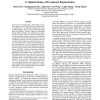Free Online Productivity Tools
i2Speak
i2Symbol
i2OCR
iTex2Img
iWeb2Print
iWeb2Shot
i2Type
iPdf2Split
iPdf2Merge
i2Bopomofo
i2Arabic
i2Style
i2Image
i2PDF
iLatex2Rtf
Sci2ools
112
Voted
AAAI
2010
2010
G-Optimal Design with Laplacian Regularization
In many real world applications, labeled data are usually expensive to get, while there may be a large amount of unlabeled data. To reduce the labeling cost, active learning attempts to discover the most informative data points for labeling. Recently, Optimal Experimental Design (OED) techniques have attracted an increasing amount of attention. OED is concerned with the design of experiments that minimizes variances of a parameterized model. Typical design criteria include D-, A-, and E-optimality. However, all these criteria are based on an ordinary linear regression model which aims to minimize the empirical error whereas the geometrical structure of the data space is not well respected. In this paper, we propose a novel optimal experimental design approach for active learning, called Laplacian G-Optimal Design (LapGOD), which considers both discriminating and geometrical structures. By using Laplacian Regularized Least Squares which incorporates manifold regularization into linear ...
Related Content
| Added | 29 Oct 2010 |
| Updated | 29 Oct 2010 |
| Type | Conference |
| Year | 2010 |
| Where | AAAI |
| Authors | Chun Chen, Zhengguang Chen, Jiajun Bu, Can Wang, Lijun Zhang 0005, Cheng Zhang |
Comments (0)

